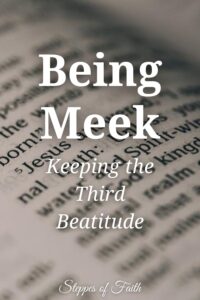
“Blessed are the meek, for they shall inherit the earth.” (Matthew 5:5)
Matthew 5-7 recalls Jesus’ famous Sermon on the Mount in which Jesus presents nine Beatitudes and two Similitudes (Matthew 5:3-16). Each directly correlates, in order, to each of the Ten Commandments (first Beatitude = first Commandment, etc.; both Similitudes = tenth commandment). Jesus preached them on a rugged hillside in Capernaum to explain more thoroughly what each Commandment means since so many in His audience did not fully understand them, including the religious leaders.
What is Beatitude? They are simply instructions or ways for people to be blessed. It is vital to note that they do not explain how to be blessed but who is blessed and why.
Jesus’ audience learned that everything they believed about God’s commandments was wrong. They found they have much more profound, personal meanings than we think, directly applying to our identity in Christ.
One such Beatitude is Beatitude #3 in Matthew 5:5.
“Blessed are the meek, for they shall inherit the earth.”
Jesus bases His words on Psalm 37:9-11.
“For evildoers shall be cut off. But those who wait on the LORD, they shall inherit the earth. For yet a little while and the wicked shall be no more. Indeed, you will look carefully for his place, but it shall be no more. But the meek shall inherit the earth and shall delight themselves in the abundance of peace.”
Though some define meekness as a weakness, most people understand it to mean that believers should simply be humble. But Jesus says that is a misinterpretation. Meekness has a very different definition.
To be meek means exercising exceeding gentleness and self-control, two fruits of the Holy Spirit (Galatians 5:22-23). However, because we have a sinful nature, believers sometimes want to use their (sometimes violent) power—physical, emotional, or political—to overcome adversities, get revenge, or find vindication. But Jesus says, if we are going to follow Him, we must practice meekness, remembering that God is in control.
“Vengeance is mine; I will repay, saith the Lord.” (Deut 32:35; Romans 12:19)
Being Meek and the Lord’s Name
Remember that each Beatitude relates directly to one of the Ten Commandments. The third Beatitude of meekness relates to the third Commandment in Exodus 20:7.
“You shall not take the name of the LORD your God in vain, for the LORD will not hold him guiltless who takes His name in vain.”
It is difficult to see the relationship between Matthew 5:5 and Exodus 20:7. What does taking the name of God in vain have to do with meekness?
As it applies to meekness, taking the Lord’s name in vain is not about casually saying “OMG” or Jesus’ name when you are surprised by something. Though using God’s name in those ways is wrong, it is not what Jesus is explaining in Beatitude #3. It has to do with hypocrisy.
The third Beatitude pertains to believers who live a lifestyle that does not match who they claim to be. Their behavior does not match their identity in Christ, and so the world perceives them as hypocritical Christians.
Rudeness and impatience are rampant in today’s society. In grocery stores, schools, workplaces, traffic, and even in the church parking lot, many believers are becoming ruder and more impatient. According to Jesus, they are not meek. They are not exercising self-control and gentleness with others. If they do not actively practice these things, they are more prone to take the Lord’s name in vain in direct violation of the third Commandment. And their consequence is that they will not inherit the earth.
But Jesus says those who exercise meekness will inherit the earth, leading some people to wonder why we should be concerned about inheriting the earth. Shouldn’t we be more concerned with heaven?
To answer this question, we must look at Genesis 12 and the Abrahamic Covenant.

Don’t Conquer the Land
Genesis 12:7 says, “Then the LORD appeared to Abram and said, ‘To your descendants, I will give this land.'” God’s promise is part of the Abrahamic Covenant God made with Israel. God promised to give His chosen people the Promised Land.
But to claim the land, Israel had to conquer its enemies. Such action leads many to assume that the bold and victorious are the ones who receive the reward (land), and those whom they conquer will share in those rewards whether they like it or not. Matthew 4:8-9, in which Satan tempts Jesus a third time, is a good example of this line of thinking.
“Again, the devil took Him up on an exceedingly high mountain and showed Him all the kingdoms of the world and their glory. And he said to Him, ‘All these things I will give You if You will fall down and worship me.'”
Satan tried to suggest that conquering the land and submitting others to your power is the way to greatness, and this was a common way of thinking throughout history. However, Jesus explains in the Beatitudes that this belief is entirely outside God’s design in the Ten Commandments.
Those who are meek do not pursue conquering the land. Instead, they set their hearts and minds on something greater.
The Second Half of Beatitude #3
The second half of the third Beatitude says that the meek will inherit the earth. To “inherit the earth” does not refer to the physical world around us but to the coming eternal kingdom—the “new earth”—that Jesus will establish after throwing Satan into the lake of fire (Rev 20:10).
“And I saw a new heaven and a new earth, for the first heaven and the first earth had passed away.” (Revelation 21:1)
Look again at Psalm 37:9-11.
“For evildoers shall be cut off. But those who wait on the LORD, they shall inherit the earth. For yet a little while and the wicked shall be no more. Indeed, you will look carefully for his place, but it shall be no more. But the meek shall inherit the earth and shall delight themselves in the abundance of peace.”
Evildoers are those who refuse God’s gift of grace. They will be “cut off” in the last days. But God promises that those who persist in their faith will inherit the earth. Better yet, they will delight themselves in the eternal kingdom’s abundant peace.
Choosing Meekness
It is important to remember Jesus’ audience when we read the Sermon on the Mount. They were the outcasts of society. They were considered “unclean,” enjoyed few comforts, and had to fight for everything they had—food, shelter, medical care, etc. Despite their circumstances, these people worked hard just to survive; None of them had a social voice. They could have chosen to overcome their oppressors with violence, but they chose meekness.
Many members of today’s church are experiencing similar situations.
Jesus says these are the people who will be the first to inherit the coming kingdom and a resurrected life. It is not because Jesus healed them (Matt 4:23-24) or met any need that they are worthy to inherit the kingdom. Rather, it is their devotion to Him and a willingness to carry His name daily in a godly manner (“take up their cross daily,” Luke 9:23).
Paul reminds us of Jesus’ instruction in Ephesians 4.
“I, therefore, the prisoner of the Lord, beseech you to walk worthy of the calling in which you were called, with all lowliness and gentleness [meekness], with patience, bearing with one another in love, endeavoring to keep the unity of the Spirit in the bond of peace.” (Ephesians 4:1-3)
Believers must walk worthy of their calling in Christ with meekness as part of their pursuit of peace with others. Such behavior brings the kingdom of God directly to those in need of a Savior. And if they “fight the good fight of faith (1 Timothy 6:12),” they, too, will enjoy eternally abundant peace in the new kingdom.

Being Meek and Bearing God’s Name
Sadly, some believers do not walk worthy of their calling. They quickly take God’s name in vain, which is why Jesus includes the Beatitude of meekness in His great sermon.
We immediately inherit the name of God when we accept Jesus’ gift of grace, and we bear His name personally. This truth cannot be emphasized enough.
When believers take the Lord’s name in vain, we sin against God and ourselves. We become poor representatives of His kingdom because we are not practicing meekness. We do not have a humble and gentle attitude and are not exercising self-control.
“Death and life are in the power of the tongue.” (Proverbs 18:21)
What we say has great meaning, especially when it involves the Lord’s name. Yet believers often disobey the third Commandment and ignore the third Beatitude. Is it any wonder, then, that non-believers often believe that Christians are hypocritical?
Surely the maker of the universe and Savior of our souls deserves better treatment.
As followers of Christ, we should not be flippant about His name. It reflects poorly on our Lord and Savior, who died the most brutal of all deaths to pay the penalty we owe for our sins. Jesus deserves more respect, and it starts with meekness and obedience to His commands.
Jesus says those who carefully keep the third Beatitude and the third Commandment (indeed, all the Beatitudes and Commandments) will find a resurrected life in the coming eternal kingdom. These are the people Jesus calls “blessed.”
